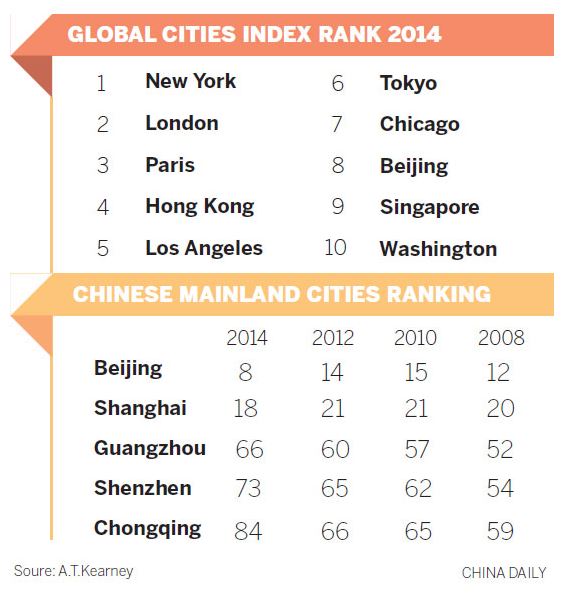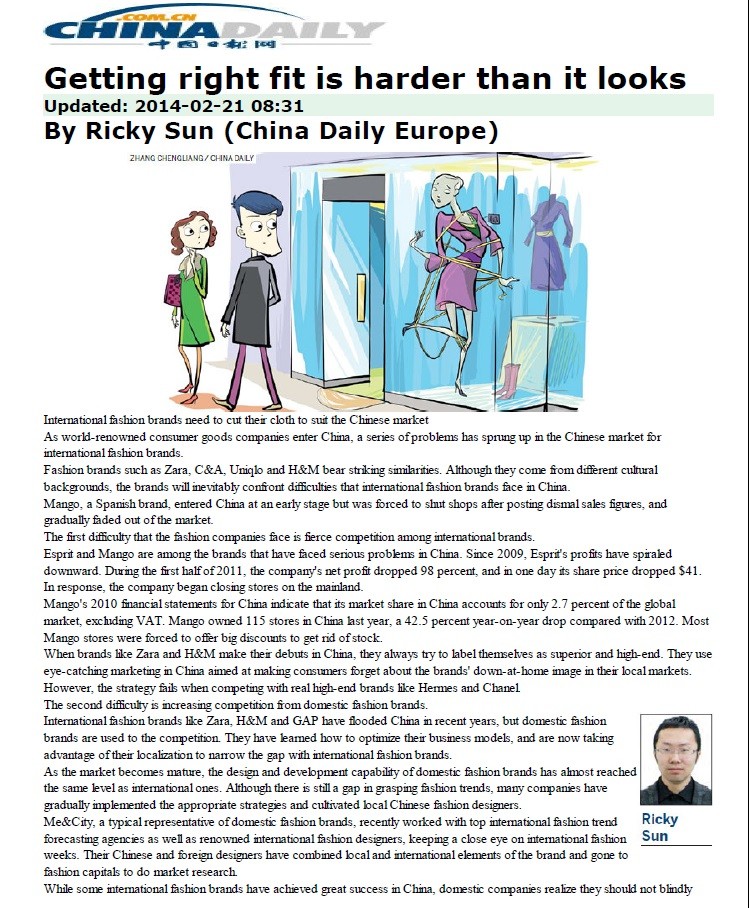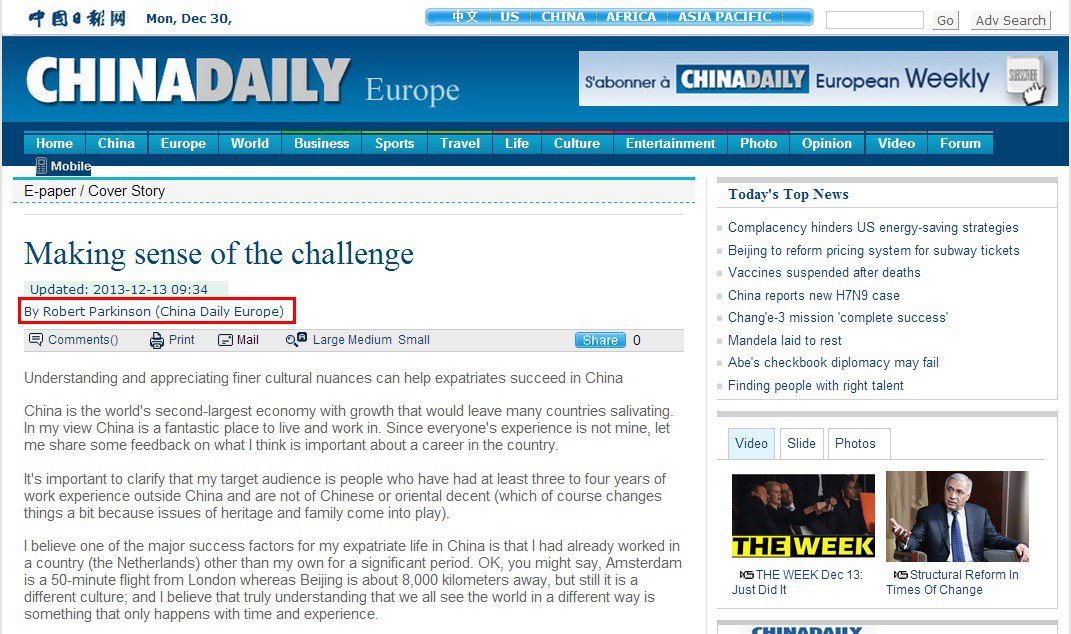
Beijing has made it into the top 10 of the world’s most global cities for the first time, ranking eighth in the A.T. Kearney Global Cities Index.
The index, introduced in 2008 by the global consulting firm, includes 84 cities.
Beijing scored an overall 3.5 in five categories, including business activity, human capital, information exchange, cultural experience and political engagement. It stood out from other Chinese cities in terms of the number of Fortune 500 companies, international schools, broadband subscribers and museums.
New York, London and Paris have held fast to their positions as first through third since 2012.
“The increasing global importance of Chinese companies has helped catapult Beijing to fourth place on the business activity dimension. This, together with some improvement in scores for human capital and cultural exchange, has been more than enough to offset declining relative performance in information exchange and international political engagement,” A.T. Kearney experts explained.
Johnson Chng, managing director of A.T. Kearney Greater China, said, “Clearly Beijing went up in the ranking due to its rising importance as a business center in addition to being the political center of China.”
However, he added, the air pollution issue is now a growing concern for many Beijing residents that, if not addressed soon, will cause an outflow of talent.
“In fact, many of my friends and business associates have moved out of Beijing in the last six months, and many are indeed contemplating the idea, too, for the sake of their family,” he said.
In a recent survey conducted by MRIC Group, an international executive recruitment firm, 47.3 percent of the 269 respondents in Beijing said they would like to relocate this year because of air quality concerns. The most-preferred destinations are North America, Shanghai, Europe, Hong Kong, Singapore and New Zealand.
As human capital is weighing ever more among the five categories, some companies have to improve the working environment to retain talent regarding the air quality in Beijing.
“Companies should prepare air purifiers especially when the buildings don’t have such machines,” said Robert Parkinson, founder and managing director of the international recruitment group RMG Selection.
Shanghai, ranking 18th in the index, was the only city on the Chinese mainland that came close to Beijing. In fact, it scored higher than Beijing in human capital, given its larger foreign-born population. Shanghai also performed well in business activity.
Beijing lags behind Shanghai in human capital because of the capital city’s “size of the foreign-born population, scores of universities in the global 500, number of inhabitants with tertiary degrees, international student population and number of international schools,” explained Chng from A.T. Kearney.
On the other hand, Shanghai ranked lower due to a less-ideal score in political engagement. Specifically, Shanghai is home to a smaller number of international organizations, embassies and consulates, think tanks, political conferences and local institutions with international reach.
The Shanghai Pilot Free Trade Zone will certainly help the city’s globalization in the long term. However, the impact and the speed of that depends on policy implementation as there are still lots of details to be sorted out in terms of how exactly Shanghai FTZ will work, Chng said.
“In the short term, I do not see any material change as most companies are simply trying to take advantage of the FTZ to help with the existing business rather than attracting significant new business,” said Chng.
Other Chinese cities in the list saw their rankings drop.
Guangzhou dropped from its rank of 60 to 66 this year due to a significant decrease in political engagement. Shenzhen dropped from 65 to 73 due to a decline in its human capital score.
Read the original article on China Daily: http://www.chinadaily.com.cn/business/2014-04/15/content_17434408.htm




 Understanding and appreciating finer cultural nuances can help expatriates succeed in China
China is the world’s second-largest economy with growth that would leave many countries salivating. In my view China is a fantastic place to live and work in. Since everyone’s experience is not mine, let me share some feedback on what I think is important about a career in the country.
It’s important to clarify that my target audience is people who have had at least three to four years of work experience outside China and are not of Chinese or oriental decent (which of course changes things a bit because issues of heritage and family come into play).
I believe one of the major success factors for my expatriate life in China is that I had already worked in a country (the Netherlands) other than my own for a significant period. OK, you might say, Amsterdam is a 50-minute flight from London whereas Beijing is about 8,000 kilometers away, but still it is a different culture; and I believe that truly understanding that we all see the world in a different way is something that only happens with time and experience.
I have seen many examples of expatriates in China landing in Beijing or Shanghai with the “I’ll get ‘them’ to do it our way (!)” mentality, and then slowly but surely their confidence wanes. Successful laowai realize that you will never change a culture thousands of years old, no matter how convincing you are. It is far better to understand and appreciate it.
The second, but perhaps most important tool for foreigners to do well in China is language. I can list at least 10 examples of people I know well who have enjoyed accelerated careers (in China) simply because they’ve made the effort to get to grips with Mandarin at a fluent or semi-fluent level. When I was at school in the 1980s and early 90s, there was tremendous emphasis on the European Initiative (basically, pupils from the age of 10 upwards were all taught German); which has since been quietly replaced with Mandarin.
Interestingly, learning English is also the most important advice I give to young Chinese people. I know many Chinese professionals who’ve done very well simply because they speak English fluently.
Staying with the practical and financial perspective for a second, the next most important element for foreigners – both early and mid-career – is to be sent to China. Packages for the talented are still good, and managers in disciplines such as finance, law and general management can expect tax equalization, paid apartments, and schooling for children on top of hefty base salaries and bonuses (Of course you have to perform, otherwise you’ll certainly be replaced).
I compare this with foreigners who move jobs within China who almost certainly will not get perks such as schooling and housing, and will probably be awarded a “local+” package, or just a comparable package to a person from the local market.
Alongside expatriation, of course one has to understand that the expectations set at the beginning of an expatriate assignment in terms of timing have very little bearing on reality: three-year assignments quite often turn in to 10/15+ year relocations. Why? Because for the vast majority of people working here, it takes at least two to three years to get used to life, and at that point, most companies want to see a return on these investment so usually they prefer their managers to stay longer (if they’re good).
Consider also that life in China offers a very high standard of living, buzz, excitement and rapid change when compared with the relative mundanity of cities, certainly in Western Europe. There aren’t many people I know who look forward to going home, and indeed, Westerners I know often retire to more developed Asian cities such as Hong Kong or Singapore.
Finally, moving more toward the profound, one should consider such factors as: are you genuinely interested in Chinese culture? Life is much easier if you are. Are you coming because you believe China is something of a magic cash machine? It isn’t. Are you prepared for the cultural differences? Read. Have you anticipated the problems? Ask. These are all questions which need addressing, and will make whichever decision you eventually take far more concrete and assured.
I’ve worked in China now for almost 10 years. I never expected to be here this long, but I love (nearly) every second and have made my life here. I would encourage anyone who’s intrigued to seriously explore a life in this gargantuan country, as there is no mistaking the significance of China in today’s world order, and for the right people there are some very serious opportunities here.
There is a lot written about China, which is valid and useful, and equally a lot, which is based on prejudice, hearsay and speculation. Above all, do yourself a favor and come here for a week, there are thousands of travel options now, so come and explore, meet people and decide whether or not the challenge is for you, because above all else China is without doubt exactly that: a challenge.
The author is founder and managing director of RMG Selection, an Asia-focused human resources and recruitment consultancy.
Read the original version at:
Understanding and appreciating finer cultural nuances can help expatriates succeed in China
China is the world’s second-largest economy with growth that would leave many countries salivating. In my view China is a fantastic place to live and work in. Since everyone’s experience is not mine, let me share some feedback on what I think is important about a career in the country.
It’s important to clarify that my target audience is people who have had at least three to four years of work experience outside China and are not of Chinese or oriental decent (which of course changes things a bit because issues of heritage and family come into play).
I believe one of the major success factors for my expatriate life in China is that I had already worked in a country (the Netherlands) other than my own for a significant period. OK, you might say, Amsterdam is a 50-minute flight from London whereas Beijing is about 8,000 kilometers away, but still it is a different culture; and I believe that truly understanding that we all see the world in a different way is something that only happens with time and experience.
I have seen many examples of expatriates in China landing in Beijing or Shanghai with the “I’ll get ‘them’ to do it our way (!)” mentality, and then slowly but surely their confidence wanes. Successful laowai realize that you will never change a culture thousands of years old, no matter how convincing you are. It is far better to understand and appreciate it.
The second, but perhaps most important tool for foreigners to do well in China is language. I can list at least 10 examples of people I know well who have enjoyed accelerated careers (in China) simply because they’ve made the effort to get to grips with Mandarin at a fluent or semi-fluent level. When I was at school in the 1980s and early 90s, there was tremendous emphasis on the European Initiative (basically, pupils from the age of 10 upwards were all taught German); which has since been quietly replaced with Mandarin.
Interestingly, learning English is also the most important advice I give to young Chinese people. I know many Chinese professionals who’ve done very well simply because they speak English fluently.
Staying with the practical and financial perspective for a second, the next most important element for foreigners – both early and mid-career – is to be sent to China. Packages for the talented are still good, and managers in disciplines such as finance, law and general management can expect tax equalization, paid apartments, and schooling for children on top of hefty base salaries and bonuses (Of course you have to perform, otherwise you’ll certainly be replaced).
I compare this with foreigners who move jobs within China who almost certainly will not get perks such as schooling and housing, and will probably be awarded a “local+” package, or just a comparable package to a person from the local market.
Alongside expatriation, of course one has to understand that the expectations set at the beginning of an expatriate assignment in terms of timing have very little bearing on reality: three-year assignments quite often turn in to 10/15+ year relocations. Why? Because for the vast majority of people working here, it takes at least two to three years to get used to life, and at that point, most companies want to see a return on these investment so usually they prefer their managers to stay longer (if they’re good).
Consider also that life in China offers a very high standard of living, buzz, excitement and rapid change when compared with the relative mundanity of cities, certainly in Western Europe. There aren’t many people I know who look forward to going home, and indeed, Westerners I know often retire to more developed Asian cities such as Hong Kong or Singapore.
Finally, moving more toward the profound, one should consider such factors as: are you genuinely interested in Chinese culture? Life is much easier if you are. Are you coming because you believe China is something of a magic cash machine? It isn’t. Are you prepared for the cultural differences? Read. Have you anticipated the problems? Ask. These are all questions which need addressing, and will make whichever decision you eventually take far more concrete and assured.
I’ve worked in China now for almost 10 years. I never expected to be here this long, but I love (nearly) every second and have made my life here. I would encourage anyone who’s intrigued to seriously explore a life in this gargantuan country, as there is no mistaking the significance of China in today’s world order, and for the right people there are some very serious opportunities here.
There is a lot written about China, which is valid and useful, and equally a lot, which is based on prejudice, hearsay and speculation. Above all, do yourself a favor and come here for a week, there are thousands of travel options now, so come and explore, meet people and decide whether or not the challenge is for you, because above all else China is without doubt exactly that: a challenge.
The author is founder and managing director of RMG Selection, an Asia-focused human resources and recruitment consultancy.
Read the original version at: